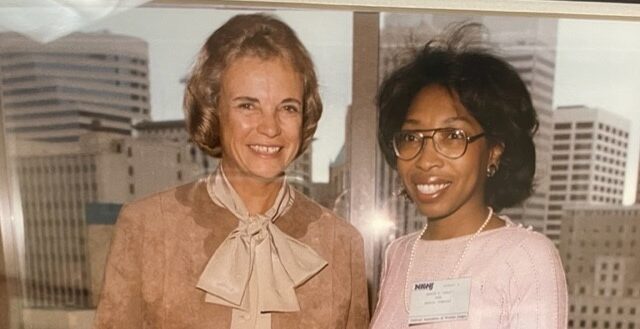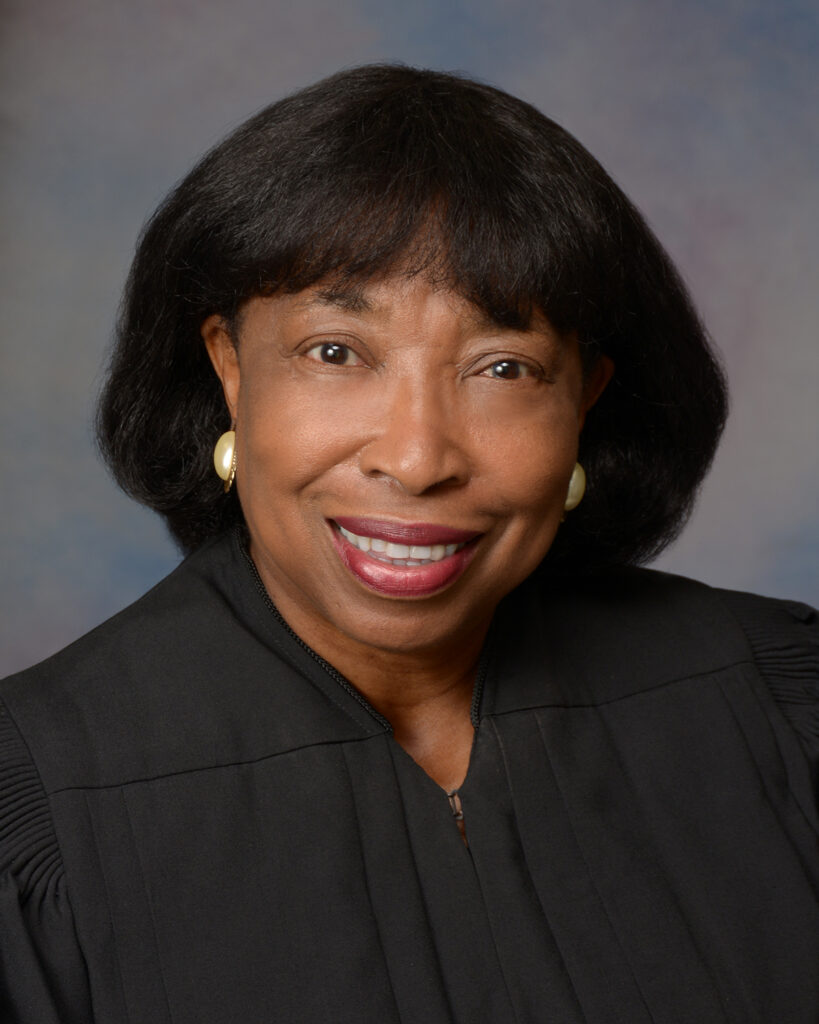

A woman of many firsts, Judge Bernice B. Donald of the United States Court of Appeals for the 6th Circuit, has become the first judge competitively selected to receive the highest honor of The National Judicial College, the Sandra Day O’Connor Award.
The formal presentation of the O’Connor Award medal is scheduled for Nov. 10 at the Heard Museum of American Indian art in Phoenix. The ceremony will take place during the Appellate Judges Education Institute’s (AJEI) annual Summit, the organization’s national conference, which this year will be in nearby Scottsdale, Arizona.
Judge Donald, 70, who earlier this year announced she was moving to senior or part-time status, became the first African-American woman to serve on the 6th Circuit following Senate confirmation of her nomination by President Obama in 2011.
On being named winner of the O’Connor Award, she wrote, “Justice Sandra Day O’Connor’s commitment to the rule of law, to equal justice under law, to civics education, to making sure that glass ceilings were shattered so that people of every race, gender, and ethnicity had the opportunity to achieve at their highest potential is inspiring and makes me extremely proud to receive the Justice Sandra Day O’Connor Award. She is the embodiment of a life of service in law, in leadership, and in judicial service. She has blazed a trail for women and for me personally.”
Among Judge Donald’s other firsts:
- In 1995 she became the first African-American woman to serve on the U.S. District Court for the Western District of Tennessee.
- In 1988, she became the first African-American woman ever to serve as a U.S. bankruptcy judge. She remained on the U.S. Bankruptcy Court for the Western District of Tennessee until January 1996.
- A 1979 graduate of the University of Memphis Cecil C. Humphreys School of Law, she was elected to the General Sessions Criminal Court in Tennessee in 1982, becoming that state’s first-ever African-American woman judge.
- She became the first African-American female officer of the American Bar Association in 2008, when she was elected secretary of the ABA, long touted as the world’s largest voluntary professional organization. She also served as the first African-American president of the American Bar Foundation, an empirical research organization.
Judge Donald is also a longtime member and leader of the National Bar Association, the oldest and largest global network of predominantly Black American attorneys and judges. In 2013 she received the association’s highest honor, the William H. Hastie Award for excellence in legal and judicial scholarship and demonstrated commitment to justice under the law.

She has lectured at numerous prestigious law schools in this country, including Vanderbilt, Yale, Northwestern and Harvard.
She is also an internationally recognized legal scholar who has served as faculty for programs in countries including Romania, Mexico, Turkey, Brazil, Bosnia, Botswana, South Africa, Namibia, Pakistan, Kyrgyzstan, Kazakhstan, Myanmar, Senegal, Rwanda, Tanzania, Russia, Egypt, Morocco, Thailand, Uganda, Kenya, Cambodia, Vietnam, the Philippines and Armenia. In 2003, she led a People to People delegation to Johannesburg and Cape Town, South Africa, and traveled to Zimbabwe to monitor the trial of a judge accused of judicial misconduct.
She frequently serves as faculty for both The National Judicial College and its counterpart for the federal judiciary, the Federal Judicial Center in Washington, D.C.
In 1996, Chief Justice William H. Rehnquist appointed her to the Judicial Conference Advisory Committee on Bankruptcy Rules, where she served for six years. In 2011, Chief Justice John G. Roberts appointed her to an indefinite term on the Judicial Branch Committee of the Judicial Conference of the United States. On October 1, 2019, Chief Justice Roberts again appointed her to serve on the Advisory Committee on Bankruptcy Rules, where she also serves as liaison to the Advisory Committee on Appellate Rules.
In a letter nominating Judge Donald for the O’Connor Award, Memphis Circuit Court Judge Rynette Hurd wrote: “Though she has excelled at the highest levels of the judicial branch, Judge Donald has always exhibited a deep commitment to service in her home community and in the legal profession. She is recognized by elementary school students in her local community as well as by dignitaries around the world because she is a true trailblazer – she prepares the way for others to come after her and to enjoy the success she has been blessed with.”
Judge Donald has received more than 100 awards for professional, civic and community activities, including the Pickering Award from the Senior Lawyers Division of the ABA (2014), the Margaret Brent Award from the ABA Commission on Women (2017), and the Lifetime Liberty Achievement Award from the ABA Tort Trial and Insurance Section (2020). Also in 2020, the ABA Labor and Employment Law Section successfully petitioned the ABA Board of Governors to create the Judge Bernice B. Donald Diversity, Equity and Inclusion Award. An expert and frequent speaker on issues of diversity, equity and inclusion, she was the award’s inaugural recipient.
The Sandra Day O’Connor Award recognizes a judge or former judge who has demonstrated extraordinary service and commitment to justice as embodied in the NJC’s Core Values, which are to: “Demonstrate an absolute commitment to justice; deliver and inspire excellence and innovation in one’s work; champion integrity; and practice engaged leadership.”
When the O’Connor Award was established in 2021, the inaugural honoree was Justice O’Connor herself, an NJC alumna and the first woman to serve on the U.S. Supreme Court. Justice O’Connor retired from public life in 2018 after disclosing that she had been diagnosed with the early stages of Alzheimer’s-like dementia. Click here to view a short film about Justice O’Connor and the O’Connor Award.
The College received 25 nominees for the 2022 O’Connor Award.
“All were outstanding and highly qualified,” said the selection committee’s chair, Angelina Tsu, an attorney in Salt Lake City, Utah, and member of the NJC Board of Trustees. “Judge Donald stood out because of the length and breadth of her service to the judiciary, her commitment to community, and how she has personified the College’s Core Values.”
The selection committee consisted of Tsu and NJC President Benes Aldana; retired Washington Supreme Court Justice Bobbe Bridge; Iowa Court of Appeals Judge Mary Chicchelly, an NJC alumna and faculty member; retired Florida Circuit Court Judge Ilona Holmes, an NJC alumna and faculty member; Medtronic Executive Vice President, General Counsel and Secretary Ivan Fong, a former clerk to Justice O’Connor; and Ohio State University Moritz College of Law Professor Deborah Merritt, a former clerk to Justice O’Connor.
The NJC Board of Trustees approved the committee’s recommendation of Judge Donald at the board’s quarterly meeting in August.
Justice O’Connor enrolled in the College’s flagship course for new judges, General Jurisdiction, shortly after her election to the Superior Court of Maricopa County, Arizona, in 1974. She served on the Arizona Court of Appeals for two years starting in 1979 before President Reagan nominated her to become the first female member of the U.S. Supreme Court in 1981. She took office the same year and retired in 2006.
In her more than 24 years on the Supreme Court, Justice O’Connor established a reputation as a pragmatist rather than someone bound by ideology. She was seen as a swing vote on many major cases, including those involving reproductive rights, legislative districting and separation of church and state.
In 2009 she founded the Sandra Day O’Connor Institute for American Democracy, whose mission is to continue her “lifetime work to advance American democracy through civics education, civic engagement and civil discourse.”
# # #
Created nearly 60 years ago at the recommendation of Supreme Court Justice Tom C. Clark, The National Judicial College remains the only educational institution in the United States that teaches courtroom skills to judges of all types from all over the country, Indian Country and abroad. The categories of judges served by this nonprofit and nonpartisan institution based in Reno, Nevada, since 1964 decide more than 95 percent of cases in the United States.

Hon. Diane J. Humetewa, the first Native American woman and the first enrolled tribal member to serve as a ...

Retired Massachusetts Chief Justice Margaret H. Marshall has been selected as the 2024 winner of the presti...

Dear Gaveliers Fans: I am delighted to announce the appointment of our first Gaveliers coaches, profiled...

Fans, I could not be more proud of the work our players put in over the summer. The difference between h...

As the 2024 Election moves in to its final weeks, just over half of trial judges who responded to a survey ...